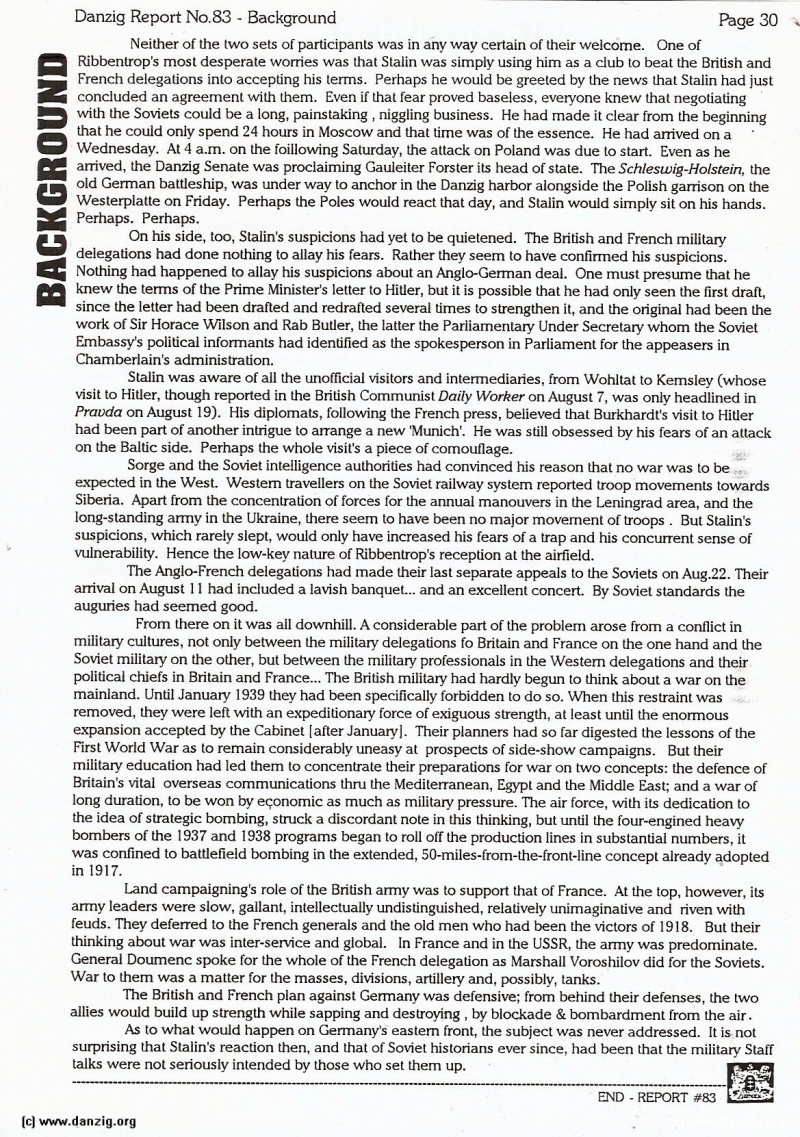
Neither of the two sets of participants was in any way certain of their welcome. One of Ribbentrop’s most desperate worries was that Stalin was simply using him as a club to beat the British and ZF rench delegations into accepting his terms. Perhaps he would be greeted by the news that Stalin had just concluded an agreement with them. Even if that fear proved baseless, everyone knew that negotiating with the Soviets could be a long, painstaking , niggling business. He had made it clear from the beginning that he could only spend 24 hours in Moscow and that time was of the essence. He had arrived on a Wednesday. At 4 a.m. on the foillowing Saturday, the attack on Poland was due to start. Even as he arrived, the Danzig Senate was proclaiming Gauleiter Forster its head of state. The Schleswig-Holstein, the old German battleship, was under way to anchor in the Danzig harbor alongside the Polish garrison on the Westerplatte on Friday. Perhaps the Poles would react that day, and Stalin would simply sit on his hands. Perhaps. Perhaps.
On his side, too, Stalin’s suspicions had yet to be quietened. The British and French military delegations had done nothing to allay his fears. Rather they seem to have confirmed his suspicions. Nothing had happened to allay his suspicions about an Anglo-German deal. One must presume that he knew the terms of the Prime Minister’s letter to Hitler, but ills possible that he had only seen the first draft, since the letter had been drafted and redrafted several times to strengthen it, and the original had been the work of Sir Horace Wilson and Rab Butler, the latter the Parliamentary Under Secretary whom the Soviet Embassy’s political informants had identified as the spokesperson in Parliament for the appeasers in Chamberlain’s administration.
Stalin was aware of all the unofficial visitors and intermediaries, from Wohltat to Kemsley (whose visit to Hitler, though reported in the British Communist Daily Worker on August 7, was only headlined in Pravda on August 19). His diplomats, following the French press, believed that Burkhardt’s visit to Hitler had been part of another intrigue to arrange a new ‘Munich’. He was still obsessed by his fears of an attack on the Baltic side. Perhaps the whole visit’s a piece of comouflage.
Sorge and the Soviet intelligence authorities had convinced his reason that no war was to be expected in the WesL Western travellers on the Soviet railway system reported troop movements towards Siberia. Apart from the concentration of forces for the annual manouvers in the Leningrad area, and the long-standing army in the Ukraine, there seem to have been no major movement of troops. But Stalin’s suspicions, which rarely slept, would only have increased his fears of a trap and his concurrent sense of vulnerability. Hence the low-key nature of Ribbentrop’s reception at the airfield.
The Anglo-French delegations had made their last separate appeals to the Soviets on Aug.22. Their arrival on August 11 had induded a lavish banquet... and an excellent concert. By Soviet standards the auguries had seemed good.
From there on it was all dowrthill. A considerable part of the problem arose from a conflict in military cultures, not only between the military delegations fo Britain and France on the one hand and the Soviet military on the other, but between the military professionals in the Western delegations and their political chiefs in Britain and France... The British military had hardly begun to think about a war on the mainland. Until January 1939 they had been specifically forbidden to do so. When this restraint was removed, they were left with an expeditionary force of exiguous strength, at least until the enormous expansion accepted by the Cabinet [after Januaryl. Their planners had so far digested the lessons of the First World War as to remain considerably uneasy at prospects of side-show campaigns. But their military education had led them to concentrate their preparations for war on two concepts: the defence of Britain’s vital overseas communications thru the Mediterranean, Egypt and the Middle East; and a war of long duration, to be won by economic as much as military pressure. The air force, with its dedication to the idea of strategic bombing, struck a discordant note in this thinking, but until the four-engined heavy bombers of the 1937 and 1938 programs began to roll off the production lines in substantial numbers, it was confined to battlefield bombing in the extended, 50-miles-from-the-front-line concept already adopted in 1917.
Land campaigning’s role of the British army was to support that of France. At the top, however, its army leaders were slow, gallant, intellectually undistinguished, relatively unimaginative and riven with feuds. They deferred to the French generals and the old men who had been the victors of 1918. But their thinking about war was inter-service and global. In France and in the USSR, the army was predominate. General Doumenc spoke for the whole of the French delegation as Marshall Voroshilov did for the Soviets. War to them was a matter for the masses, divisions, artillery and, possibly, tanks.
The British and French plan against Germany was defensive; from behind their defenses, the two allies would build up strength while sapping and destroying , by blockade & bombardment from the air.
As to what would happen on Germany’s eastern front, the subject was never addressed. It is not surprising that Stalins reaction then, and that of Soviet historians ever since, had been that the military Staff talks were not seriously intended by those who set them up. -
Danzig Report Vol. 1 - Nr. 83 - April - May - June - 1994, Page 32.
Hits: 1415
Added: 09/07/2015
Copyright: 2024 Danzig.org

